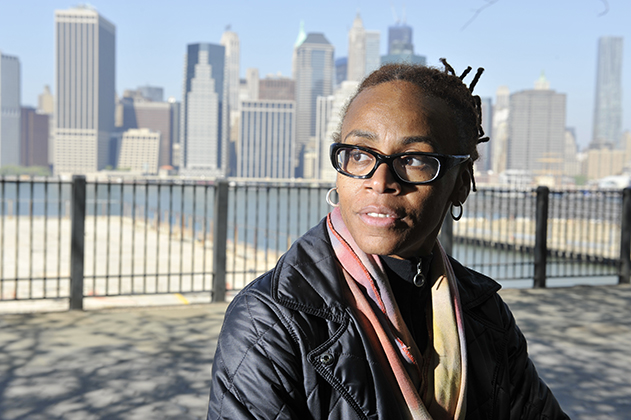News Details
Approaching Science from a Social Work Perspective

Photography by: Candace diCarlo
Alumni
09/01/12
SP2 Alumna advocates for social justice and policies that empower individuals and strengthen society.
“I am a complex person and a truth teller and sometimes it is a lonely place to be”, so says social policy and bioethics activist Olivette Burton, MBE, MSW ‘04. “But I always know that my love for my family, people and my work will never wane because it is a part of me, and I know that sometimes to do something different you might be alone. I can live with that. I never become desperate. My passion and creative energy for my loves are vivid, energized and forward thinking.”
Trained at the University of Pennsylvania’s School of Policy & Practice, Burton designed the School’s dual degree program in Social Work and Bioethics. She served as the Executive Managing Editor for the American Journal of Bioethics, the leading ethics journal in the world and is the former chair of the institutional review board at NYC Department of Health and Mental Hygiene. Burton is also up for consideration of a Fulbright award to conduct research in Africa next year.
Burton’s idea for the dual-degree was conceived during her OB/GYN internship at the Hospital of the University of Pennsylvania, which Burton describes as a life changing experience. During this internship, Burton encountered patients from all walks of life who, in addition to their medical issues, were struggling with a host of challenges including poverty, drug addiction, recent immigration and homelessness.
“On my first day, I watched a patient go through the heart-wrenching experience of delivering a dead baby because she had used crack cocaine on her birthday after having been clean for months,” recalls Burton. “Another patient had given birth in an illegal sweatshop and was fearful for her job and immigration status. She didn’t want anybody to know so, she put the baby in the toilet. Thankfully he survived.”
These experiences made Burton acutely aware that while the hospital’s medical teams were highly-skilled, they weren’t equipped to help patients emotionally. “There was little understanding of the psycho-social aspects and life circumstances of patients,” she says. “The science hadn’t caught up to the social. I created the dual degree to try to bridge that gap.”
For nearly eight years, Burton was Chair of the Institutional Review Board of the NYC Department of Health and Mental Health, one of the world’s preeminent public health agencies. With a mission of protecting the rights and welfare of human subjects, the IRB reviews every aspect of studies involving human subjects, including the design, recruitment practices, compensation and treatment of subjects, as well as whether the proposed study will produce useful information for the field and for the diverse populations served.
“Generally, research is consumed with the science of studies but doesn’t look at the social effects of these studies on the disenfranchised,” she explains. “People have a right to know why the research is being conducted, and to be fully informed, regardless of cultural, race and socio-economic status.”
Over the last few years, Burton has expanded her direction to encompass international issues. She is the executive founder of a new humanitarian endeavor called “Sweet Nation,” whose mission includes healthcare and bioethics, social service administration, civil society, policy and advocacy, human rights, and international media information to improve the lives of people of color in the United States, the Caribbean, Europe, and Asia. Sweet Nation combines the missions of social welfare/work biodiversity and policy with technology and medicine, for the purpose of understanding and advocating the challenges faced by numerous populations due to rapid urbanization both domestically and internationally. It provides expert advice and consulting services to academic institutions, corporations, labor organizations, community organizations, and NGO’s involved in the delivery of social services (primarily for women and children), as well as interventions for human rights programs and research. Burton’s ultimate goal is that Sweet Nation makes all people socially and morally accountable to each other.”
For Burton, the SP2 community is like a second family that has supported her both personally and professionally from the very first day. “Penn is such a unique place,” she says. “At other institutions it wouldn’t be possible for a student to create a new dual degree. But the Deans and leadership at Penn recognized my penchant for social work policy and advocacy. Penn is not only open to new ways of doing things, but also is stronger for it. It is a nurturing environment, which continues to nurture me to this day. No matter where I go in the world to talk about the work I love, I always come home to Penn.”